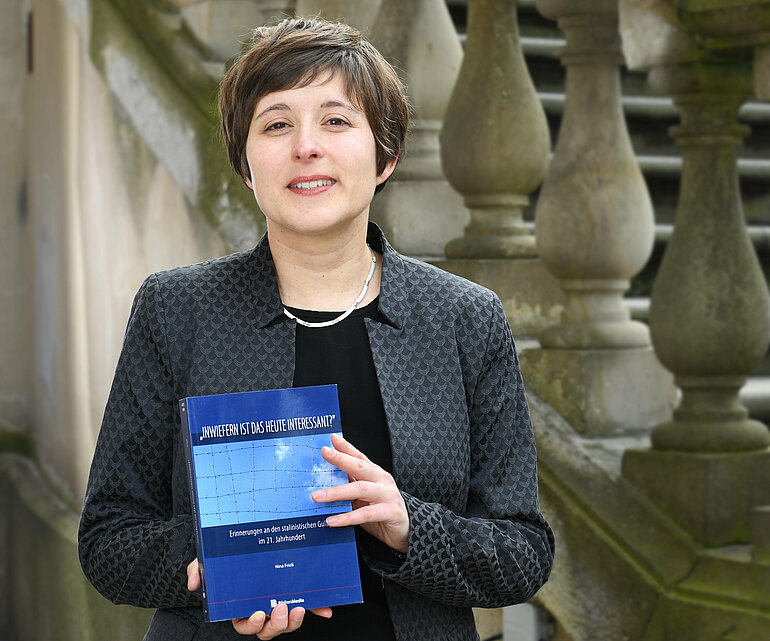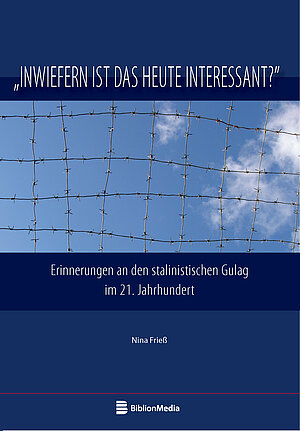“Critical voices engage too little in the public discourse”
In her dissertation "How interesting is that today?", Nina Frieß examines contemporary forms of memory of Stalin-era repression, in particular the Soviet labour camps known as the Gulag. Her research focuses on three media productions based on classics of labour camp literature: the TV series "Lenin’s Testament", which was aired in 2007 on the second-largest Russian broadcaster and recounts the life and work of Varlam Shalamov; the opera "One Day in the Life of Ivan Denisovich", which premièred in 2009 and is based on the novel of the same name by Aleksandr Solzhenitsyn; and the 2009 international feature film "Within the Whirlwind", which is based on the memoirs of Eugenia Ginzburg. All three authors spent many years in labour camps and described their experiences in various texts which today form the canon of labour camp literature.

What interests you about the Russian culture of memory?
In 2007, I did a three-month internship with Perm-36, a non-governmental organisation in the Russian Urals. At the time, Perm-36 ran the only Gulag museum on the site of a former labour camp. I wanted to explore from an academic perspective how people in Russia deal with their past.
Is it possible to talk about a uniform culture of memory in Russia?
No, I would even say that the Russian culture of memory is defined by its huge fragmentation. Essentially, everyone remembers what they want to, and only a fraction of the population is interested in remembering the dark pages of the past—for example, what happened under Stalin’s rule between 1927 and 1953. In those years, some 20 million citizens entered the Soviet labour camps, where many died. The majority of the population is prepared to remember the positive aspects of Russian and Soviet history, even as embellished by the government.
How does the government of President Vladimir Putin influence today’s image of history?
With Putin, things aren’t quite as straightforward as you might imagine. There have been speeches in which he commemorated those who died during the Stalin era and suffered under the dictatorship. At the same time, he has also said, "But in other countries things were much worse" and has emphasised how many great chapters there are to Russian history and that bad experiences must be seen in the context of their time. The whole Russian elite pushes efforts to anchor a positive narrative in the heads of young Russians in particular. But at least until a few years ago, until the end of Putin’s second term in office and then under Dmitry Medvedev, there was a relatively liberal transition period in which the horrors of history received some attention. The materials that I research in my dissertation were produced in this period, and they are not only independent productions but also ran in part on state television or on state platforms.

How were these productions received by Russian society?
The TV series "Lenin’s Testament" reached the largest audience and certainly portrays things very dramatically. It shows violence, death, and the suffering of prisoners through the eyes of the protagonist, Varlam Shalamov. In the feature pages of magazines, the series was highly praised. Reviews highlighted how crucial it is to deal with this chapter of history. But this discussion did not attract wider attention in society. And that is symptomatic for Russia. Nor did the opera "One Day in the Life of Ivan Denisovich" generate any noteworthy reactions among the population. Although it was a topic in all the daily newspapers and the main TV news bulletins across the country, it didn’t lead to a rethink of the culture of memory. Interestingly, the film "Within the Whirlwind", a German-Belgian-Polish co-production, was well received by Russian audiences. It must be said that the film reduces Ginzburg’s biography to that of a woman who survived the Gulag through the love of her life. But contrary to the uniformly negative criticism in the West, where the film was denounced as a "labour camp sob story", the feeling in Russia was that the film was authentic and that more such films were needed. But only very few enthusiasts discussed the film in forums.
How can these reactions be explained?
Many people look for exactly these kinds of representations. Critical voices engage too little in the public discourse. When in the early 1990s the first archives were opened and information about the scale of the repression became public, the interest in the past was great and the topic was present in the media. But with the collapse of the Soviet Union, people became increasingly preoccupied with other issues. The population was concerned with daily survival. And so the moment passed to establish a comprehensive culture of memory. With the rocky transfer of power from Medvedev to Putin, the screws were tightened and attempts were made to keep the reviled advocates of memory in check. Perm-36 had to shut down its political work, and the museum was taken over by the state. This shift, of course, reveals a very different perspective. It’s a sign that what was possible between 2007 and 2013 would no longer be possible today to the same extent. And nowadays, most of Russian society is just not interested in that topic any more.
The interview was conducted by Yvonne Troll, communications coordinator at ZOiS.
[1] Besides these three main works Nina Frieß analysed the novel “Oblivion” by Sergei Lebedev that was published in 2011 and a number of crime novels by Anglo-American authors that are set in the Soviet Union during the Stalin era.
Cultural and literary researcher Nina Frieß works as a research associate at ZOiS. Her project "Literature and power in the post-Soviet space" focuses on the role of Russian and Russian-language literature in selected post-Soviet countries. The dissertation that led to her book "How Interesting Is That Today?" was awarded the Klaus Mehnert Prize by the German Association for East European Studies.
Frieß, Nina: "Inwiefern ist das heute interessant?" Erinnerungen an den stalinistischen Gulag im 21. Jahrhundert. Leipzig, Biblion Media 2016.